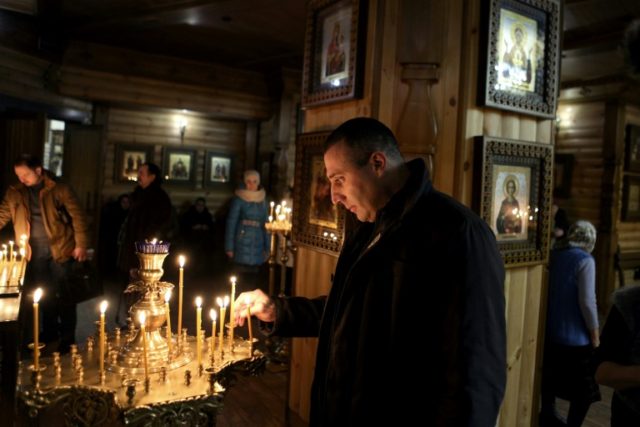Lugansk (Ukraine) (AFP) – Speaking Russian with a strong Italian accent, Andrea Palmeri attracts attention in Lugansk, the separatist-held province in eastern Ukraine.
“I converted to the Orthodoxy, but I always pray in Italian,” the far right-wing hooligan turned pro-Russian fighter told AFP after making the sign of the cross as he entered a Russian Orthodox church.
“Fate sent me here to Lugansk,” he said of the de-facto capital of one of two self-proclaimed republics by Ukrainian separatists.
Palmeri was the leader of an ultras group aligned with the football team in Lucca, central Italy, but the gang’s neo-fascist views and violent activities saw him facing a jail sentence at home.
He fled the country and arrived to fight with the pro-Moscow rebels in eastern Ukraine — alongside several hundred other Europeans, according to Kiev authorities.
“The Serbs were the first who came… Then the Italians, then the French appeared,” said Palmeri, whose upper right arm is covered with a tattoo of the Russian national symbol of a double-headed eagle.
Palmeri claims he was the first Italian to join the Russian-backed rebels in 2014, but has now been followed by some 30 compatriots.
Many of those have since been killed, he said, in a conflict that has dragged on for four years and cost more than 10,000 lives.
Kiev and its Western allies accuse Russia of supporting the separatists by deploying several thousand regular Russian troops into Ukraine, a charge that Moscow denies, admitting only the presence of Russian volunteers and off-duty soldiers.
Palmeri said he had made the decision to go to Ukraine after watching Russian TV news, which described authorities in Kiev as neo-Nazis and broadcast false reports that Russian-speakers were being exterminated.
Palmeri, who was married to a Russian woman at the time, said he “couldn’t stay at home” when he saw what was happening in Ukraine.
He described the war as a battle “between liberalism and Russian values” fought by parts of Europe, America and the Russian state.
– ‘Real war not interesting’ –
In his native Italy, Palmeri faced five and a half years in jail over accusations of violent crimes and was put under house arrest.
But he managed to escape and fled the country even though his passport had been confiscated, the Italian local newspaper Il Tirreno reported.
Then he reappeared thousands of kilometres to the east of Europe.
But the untried Italian militant was quickly forced to come to terms with the realities of conflict during the freezing Ukrainian winter.
Under the nom de guerre Italia, Palmeri took part in fighting for several months until his feet succumbed to frostbite during the battle for the town of Debaltseve, a key railway hub, in 2015.
“Real war is not as interesting as in the movies. You are scared all the time there… You cannot sleep for two or three days, you are constantly under fire,” he told AFP.
And Palmeri’s involvement in the violence has only aggravated his problems with Italian justice, which he says is now pursuing him for being a mercenary.
“We are not terrorists or mercenaries, I consider myself as a volunteer,” Palmeri said, while declining to provide details on the source of his income in war-scarred Lugansk.
He does not want to return to his native country for fear of being re-arrested, and regrets being separated from his seven-year-old son.
Instead he has built — with the help of “Italian investors” — a bakery in Alchevsk, an industrial town near Lugansk, which he hopes to open in the coming weeks.
“When I arrived here, I certainly did not expect I would never be able to go back home,” he said.

COMMENTS
Please let us know if you're having issues with commenting.